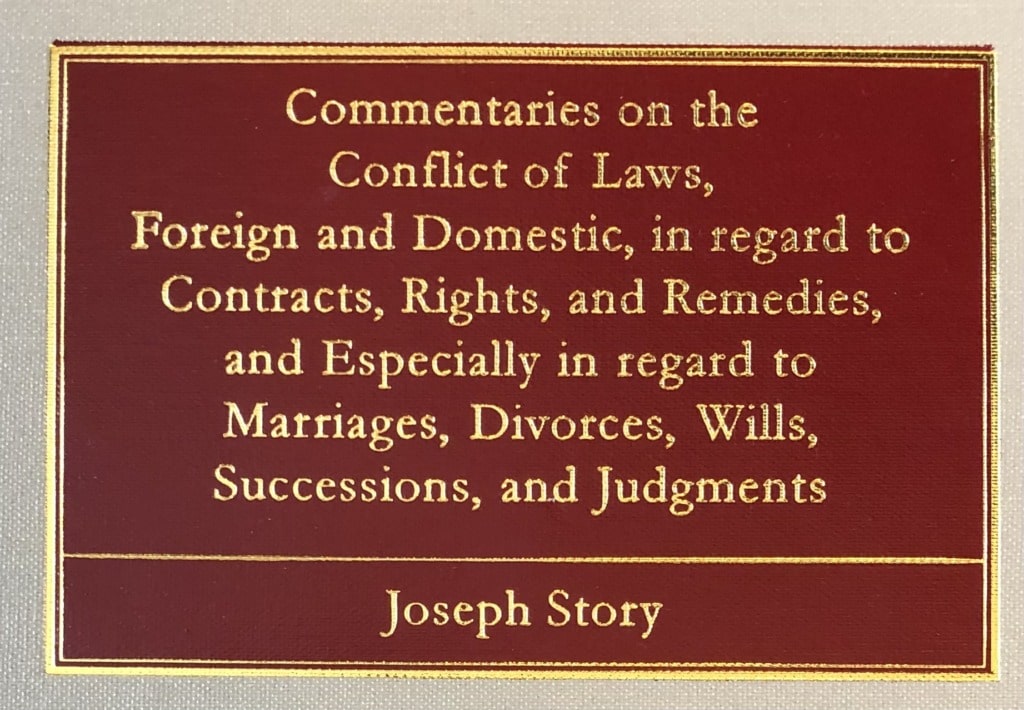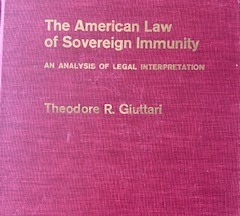Havlish Plaintiffs File a Potentially Misleading Brief Claiming Entitlement to Afghan Central Bank Assets
The 2021 return of the Taliban to power in Afghanistan has led to litigation in the United States over the assets of the Afghan Central Bank (“DAB”). As I explained in an earlier post, an executive order by President Biden froze about $7.0 billion in DAB assets held in New York. A license from the…
Continue ReadingCVSG in Usoyan v. Turkey: Can Turkey Use Force in the United States to Protect Its President?
A violent clash in Washington, D.C. between Turkish security forces and protestors has led to civil litigation with interesting questions about the authority of foreign security details and the immunity to which foreign governments are entitled. Turkey has petitioned for certiorari, and the Supreme Court has shown an interest in the case by calling for…
Continue ReadingThrowback Thursday: Joseph Story and the Comity of Nations
One of the most influential books on transnational litigation was written nearly two centuries ago by a sitting Justice of the U.S. Supreme Court. Joseph Story’s Commentaries on the Conflict of Laws, first published in 1834, synthesized foreign and domestic cases regarding conflict of laws and the enforcement of foreign judgments. Story endorsed international comity…
Continue ReadingForeign Sovereign Immunity and Choice of Law—State, not Federal
In Cassirer v. Thyssen-Bornemisza Collection Foundation, the Supreme Court unanimously held that, in adjudicating state-law claims against a foreign state or instrumentality under one of the exceptions to the Foreign Sovereign Immunity Act (FSIA), 28 U.S.C. § 1602, et seq., a federal court must apply the choice-of-law rules of the forum state rather than federal…
Continue ReadingSecond Circuit Holds that Forum Non Conveniens Applies Under the FSIA
In Aenergy, S.A. v. Republic of Angola, the Second Circuit held that the standard doctrine of forum non conveniens applies to suits against foreign states under the Foreign Sovereign Immunities Act (FSIA). This holding is consistent with what the D.C. Circuit has said about forum non conveniens in FSIA cases. The Second Circuit’s decision would likely…
Continue ReadingWhat Should Happen Next in Cassirer?
Most of the procedural questions that arise in domestic litigation have a counterpart in transnational litigation. In Cassirer v. Thyssen-Bornemisza Collection Foundation, the Supreme Court confronted the transnational counterpart to Klaxon v. Stentor Electric Manufacturing Co., a much-debated choice-of-law case decided in 1941. As Justice Kagan noted in her opinion for a unanimous Court, “[a]lthough…
Continue ReadingCassirer and FSIA Choice of Law
Today the Supreme Court unanimously resolved an important case about choice of law under the Foreign Sovereign Immunities Act (FSIA). Cassirer v. Thyssen-Bornemisza Collection Foundation is a lawsuit about the ownership of a Camille Pissarro painting, surrendered by Lilly Cassirer to the Nazis and now held by a foundation created and controlled by the Government…
Continue ReadingSupreme Court decides Cassirer v. Thyssen-Bornemisza Collection Foundation
The Supreme Court today unanimously held in Cassirer v. Thyssen-Bornemisza Collection Foundation that state choice-of-law rules apply in cases brought against foreign sovereigns alleging non-federal claims.
Continue ReadingThrowback Thursday: Foreign Sovereign Immunity in 1970
A fascinating and obscure book from 1970 discusses the relationship between domestic and foreign state immunity, the power of the executive branch over immunity, reciprocity, and – of course – the legislative reforms that would several years later become the Foreign Sovereign Immunities Act. The American Law of Sovereign Immunity, published in 1970 by Theodore…
Continue ReadingAfghan Central Bank Assets Should Be Immune in Cases against the Taliban
Victims of terrorist attacks who obtained default judgments against the Taliban have requested the turnover of Afghan central bank assets frozen by U.S. sanctions. Because these assets are protected by foreign sovereign immunity and because no exception to immunity is applicable, courts should not order the assets turned over to the judgement-creditor plaintiffs, despite the terrible injuries that they and their families have suffered.
Continue Reading




